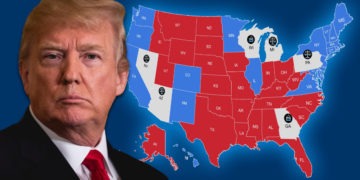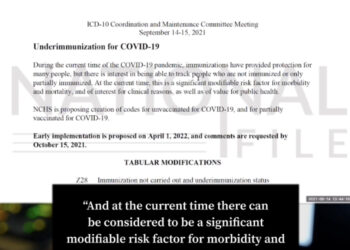The Trump campaign has ongoing litigation in four states, Nevada, Arizona, Michigan, and Pennsylvania as recounts happen in Wisconsin and Georgia. But the question of what can be done if provable actions of vote fraud and ballot tampering are left in place had taken center stage. There is something that can be done.
While the Biden campaign attempts to falsely brand Joe Biden “president elect,” the fact of the matter is this. The election isn’t even close to being over. Just as the lack of a concession speech from President Trump negates Biden’s claim to “president-elect” so, too, does it open the door for a constitutional and legal solution.
The President of the United States, as most people know if they were lucky enough to have been made to take a Civics or US History class in school, is not elected directly by the public. Instead, the President and Vice President are elected in a vote in the Electoral College.
The brilliance of the Electoral College is in that it protects the nation from falling into majority rule or mob rule, even as it protects the rights of the minority.
But very few understand the process in which the Electoral College chooses the President and Vice President.
The Electoral College process is mapped out in the US Constitution and is governed by the Electoral Count Act, an 1887 law amended in 1948.
This law, as amended, is comprehensive, and sets the exact day that the Electoral College is mandated to meet: The Monday after the second Wednesday of December.
On that day (in 2020 this falls on December 14) the electors appointed by each state formally meet to cast their votes. This day is mandated and is not reschedulable; it is a hard deadline that is mandated and codified into federal law. States must have their electors chosen by then.
REMINDER TO THE REPUBLICAN STATE LEGISLATURES, YOU HAVE THE FINAL SAY OVER THE CHOOSING OF ELECTORS, NOT ANY BOARD OF ELECTIONS, SECRETARY OF STATE, GOVERNOR, OR EVEN COURT. YOU HAVE THE FINAL SAY — ARTICLE II OF THE FED CONSTITUTION. SO, GET READY TO DO YOUR CONSTITUTIONAL DUTY
— Mark R. Levin (@marklevinshow) November 5, 2020
In the event that a state does not have a slate of electors seated due to a litigated or otherwise disputed election, the Electoral Count Act explicitly accounts for what to do if electors cannot be chosen by voters:
“Whenever any State has held an election for the purpose of choosing electors, and has failed to make a choice on the day prescribed by law, the electors may be appointed on a subsequent day in such a manner as the legislature of such State may direct.”
Federal law unambiguously empowers the states – through their legislators – to decide how a state’s electoral votes shall be awarded if no electors have been seated because an election has “failed to make a choice.”
In fact, there is Supreme Court precedent codified into law in the Bush v. Gore ruling in the election of 2000. The High Court majority affirmed that, “…the State legislature’s power to select the manner for appointing electors is plenary; it may, if it so chooses, select the electors itself…”
If the law is to be followed with fidelity, the state legislators in Pennsylvania, Georgia, Wisconsin, Michigan, Nevada, Arizona, and other states where disputes – for any reason – may arise must openly declare that they will only accept a Biden victory after thorough and complete investigations of all allegations of fraud and malfeasance have been satisfied.
If these investigations are obstructed in any way and by anyone, they must – by the mandate of federal laws – exercise their Constitutional power to choose electors that restore the will of the people.





















